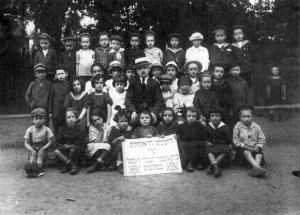It is hard to say that nationalism was a completely new phenomenon in Carpatho-Rus between the World wars. However, it can certainly be argued that the annexation of the region to Czechoslovakia and the political developments of the 1920s-30s constituted a productive platform for the rise in the national identity of many groups in the region, and the Jews were no different when they “discovered” the Zionist movement and were exposed to it. The Jews in the Transcarpathian region generally had a clear tendency toward a rather rigid religious tradition, which would not have enabled them to accept the basic principles of Zionism; in fact, there was no secularization on a significant scale among the Jews of the region.
In addition, the development of the Zionist movement also encountered a fairly strong Communist movement in the region, with significant Jewish support. Nevertheless, after the First World War, the first nuclei of Zionist activity in Carpatho-Rus, established by Jewish veterans who returned after the war from Poland and Russia, where they began to interact with Zionist activists. Amid bitter struggles, they were establishing centers of Zionist activity and Hebrew education throughout the region, renowned not only in Carpatho-Rus but throughout Czechoslovakia.
One of the first activities of the Zionist organization in the region was the establishment of the “Alliance of Hebrew Schools in Carpatho-Rus” in Munkács in 1920, and in September 1924 the flagship of the Hebrew education in Carpatho-Rus – the Hebrew Gymnasium in Munkács – was unofficially established. In fact, all the Zionist movements were active in the Carpathians and devoted considerable effort to the struggles between them. These were not just expected struggles between members of “HeChalutz” and “Betar”, but even within the “HeChalutz” movement in Carpatho-Rus there was a bitter struggle between members of “HaShomer Hatzair” and “HeChalutz HaTzair”. Members of the youth movements were especially dominant in various Zionist activities, and during the years of crisis that the communities in the region experienced, from the late 1930s until their destruction, they often informally filled different leadership roles. However, it is important to emphasize that Zionism did not succeed in establishing roots among the majority of the Jewish public in Carpatho-Rus, which, as stated, remained faithful to the rule of the rabbis.
